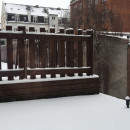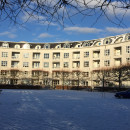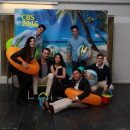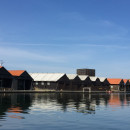Wouldn't Live Here But a Great Experience Past Review
By Jeanie S (Supply Chain Management, The University of Texas at Austin) - abroad from 02/01/2016 to 06/17/2016 with
Copenhagen Business School: Copenhagen - Direct Enrollment & Exchange
Absolutely. Living in a foreign country alone is difficult. The first thing you learn is how much you feel like you're missing out at home - your family, pets, friends, food (a very big thing), the weather, etc. It might make you feel lonely if you don't find people you really click with right away. But it's great exposure to people that don't think like you, that are totally different from you, and you learn from them. The world really feels small after being abroad.
Review Photos





Personal Information
| How much international exposure did you have prior to this program? | 6 months+ |
Review Your Program
|
* Overall educational experience
Academic rigor, intensity, resources, etc. |
Copenhagen Business School is hyper-focused on soft skilled business. Exams were different from home and therefore challenging for me (which is okay). They have several kinds of exams: 4 hour written sit in, home assignments, and an essay with a 20 minute oral exam following the essay turn in. I think having various kinds of exams is good practice, especially if you come from somewhere where finals are usually sit-in. However, exam requirements are not clearly outlined, the professors know very little about the exam, and grading leans toward the subjective side. I have two major qualms about my academic experience here: the first is that the classes are extremely focused on theories and models and are rarely used for application. Professors say they want students to demonstrate the ability to apply knowledge of the course and not simply repeat it, but during oral exams ask for students to, essentially, spit out information verbatim again. My second qualm (that doesn't have a lot to do with CBS) is how grades will transfer over to my university at home. A 7 transfers to a C at home and a 4 would fail me. However, a 2 is considered passing at CBS and a 7 is the top of the bell curve. If we base and compare it to McCombs standard, that means a 7 is about a 3.2 out of 4.0. A 4 is also widely regarded as a common grade given out and is more akin to a C at home. The exchange grading system is based on European standards but does not translate properly to UT where we use a +/- system. |
|
* Host Country Program Administration
On-site administration of your program |
Very decentralized; you never know who to email. |
|
* Housing:
How satisfied were you with your living arrangements? |
Housing is limited in Copenhagen, so it's difficult to find a place. Dorms through CBS (privately owned; not owned by CBS but mediated through school) are pretty expensive, BUT it really depends on which dorm you live in. I was pretty unsatisfied with Svanevej except for the great location. The management was pretty bad and my room was horrible. Tietgen, Kathrine Kollegiet, and Holger are all great places to live apparently, though. |
| * Food: |
It is so expensive to eat out in Copenhagen and the food options are pretty dismal if you come from the USA. Sushi is great here, but avoid all other Asian foods at any cost. You will get tired of gourmet burgers and pizza which is about the only thing they can do here. Getting a meal from a Michelin chef is also awesome, but it's not something you do every weekend. There's a great street food market here though that saved my faith in this place. And Danes really do pastries and cakes well. Groceries are also cheap because there's lots of competition. |
|
* Social & Cultural Integration:
How integrated did you feel with the local culture? |
CBS has a great Buddy Program and my buddy and I got along fantastically. The Danes are an easy going culture and though they're initially a bit closed off to strangers, many introduced themselves to me first and are fun to talk to. |
|
* Health Care:
How well were health issues addressed during the program? |
Healthcare is free and medicine is cheap once you have your CPR number (like a Danish SSN). Only problem was that I could only really go to my doctor (assigned by the government) in a one-hour window everyday because making appointments is difficult when you don't know Danish. Medicine is centralized through a computer system that sends out your order to all pharmacies in the city. Very easy. |
| * Safety: |
The biggest crime in Copenhagen is bike theft. I don't think I need to say more. I felt very safe walking alone at night, but of course, it's important to stay wary. |
| If you could do it all over again would you choose the same program? |
Yes
To be honest, no, if it was based on my program. But I met my boyfriend here and he's standing right behind me watching me type this so I'm obligated to say yes. So unless you're going to fall in love in Denmark, don't do it. Especially if you like warm weather. |
Finances
|
* Money: How easily were you able to live on a student's budget?
(1 = not very easy/$200+ on food & personal expenses/week, 2.5 = $100/week, 5 = very easily/minimal cost) |
Copenhagen is one of the most expensive cities to live in in the world. The rent is high because housing is limited, transportation is (awesome but) disgustingly overpriced, my laundry is 3x the price here than back home, and eating out is barely affordable on a student budget. However, groceries are cheaper than in the States because they have discount grocery stores and many basic products (like eggs and milk) are subsidized by the government. |
| Not including program expenses, about how much money did you spend on food and other expenses each week? | Counting my rent, $300-400 |
| Do you have any general money-saving tips for future study abroad participants? | Books cost nothing here if you're used to American textbook prices. Don't eat out often and cook your own food. Bike if you can bear the cold and the traffic. Make a budget or at least record your expenses so you're aware how much you spend. And if you can find housing on your own, having one away from the city center is okay because public transport is excellent here. For example, I live in Nørrebro and pay over 800 USD/month while my boyfriend lives in Skovlunde and he only pays 550 USD/month. And his apartment is way nicer than mine. But finding housing in Copenhagen is challenging, so ask around early and still apply for dorm housing if you can. |
Language
| * Did your program have a foreign language component? | No |
Direct Enrollment/Exchange
| * Did you study abroad through an exchange program or did you directly enroll in the foreign university? | Exchange |
Other Program Information
|
* Where did you live?
Select all that apply |
|
|
* Who did you live with?
Select all that apply |
|
|
* Who did you take classes with?
Select all that apply |
|
| About how many local friends did you make that you will likely keep in touch with? |
A Look Back
| * What did you like most about the program? |
|
| * What could be improved? |
|
| * What do you know now that you wish you knew before going on this program? | How to do the VISA and get all the formal stuff done (like your CPR number)! It's actually easy if you get someone to help outline it out for you. |
Reasons For Studying Abroad
| To help future students find programs attended by like-minded individuals, please choose the profile that most closely represents you. |
The Academic or LinguistYou went abroad with specific academic goals in mind; the program credentials and rigor of your coursework abroad were very important to you. You had a great time abroad, but never lost sight of your studies and (if applicable) were diligent with your foreign language study. Good for you! |








